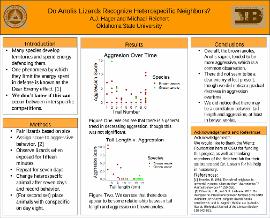| dc.contributor.advisor | Reichert, Michael | |
| dc.contributor.author | Hager, A. J. | |
| dc.contributor.other | Wentz Research Scholars | |
| dc.date.accessioned | 2021-05-25T18:58:17Z | |
| dc.date.available | 2021-05-25T18:58:17Z | |
| dc.date.issued | 2021-04 | |
| dc.identifier | oksd_Wentz_2021_hager | |
| dc.identifier.citation | Hager, A. J., & Reichert, M. (2021, April). Do Anolis lizards recognize heterospecific neighbors? Poster session presented at the Oklahoma State University Wentz Research Scholars Symposium, Stillwater, OK. | |
| dc.identifier.uri | https://hdl.handle.net/11244/329861 | |
| dc.description.abstract | Many organisms establish territories, though the reasons are varied and not always understood. Organisms that establish territories often must defend them against invaders. Territorial animals sometimes exhibit “dear enemy effects”, whereby two neighbors will behave less aggressively towards each other than they will towards strangers (Temeles 1994). The dear enemy effect allows for a decrease in time and energy expenditure by fighting less often. With the global increase in invasive species, more organisms are having to compete with individuals of new invading species to establish territories. For instance, Anolis carolinensis (Green Anole) is endemic to the southeastern U.S., and Anolis sagrei (Brown Anole) occurs on many Caribbean islands, but was introduced into Florida in the mid-1900s and now interacts with green anoles. These species are known to compete with one another for territories, and there is concern that A. sagrei is displacing the native A. carolinensis ( Edwards and Lailvaux 2013). The dear enemy effect has never been shown to occur between any heterospecific (different species) interaction. We hope that with this project we will take a step towards understanding interactions between invasive species and the endemic species that they affect. | |
| dc.description.sponsorship | Lew Wentz Foundation | |
| dc.format | application/pdf | |
| dc.language | en_US | |
| dc.publisher | Oklahoma State University | |
| dc.rights | In the Oklahoma State University Library's institutional repository this paper is made available through the open access principles and the terms of agreement/consent between the author(s) and the publisher. The permission policy on the use, reproduction or distribution of the article falls under fair use for educational, scholarship, and research purposes. Contact Digital Resources and Discovery Services at lib-dls@okstate.edu or 405-744-9161 for further information. | |
| dc.title | Do Anolis lizards recognize heterospecific neighbors? | |
| osu.filename | oksd_Wentz_2021_hager.pdf | |
| dc.description.department | Integrative Biology | |
| dc.type.genre | Presentation | |
| dc.type.material | Text | |
| dc.subject.keywords | dear enemy effect | |
| dc.subject.keywords | competition | |
| dc.subject.keywords | invasive species | |
